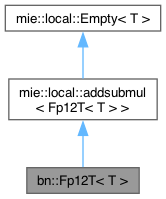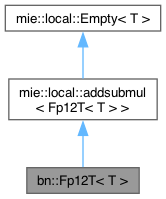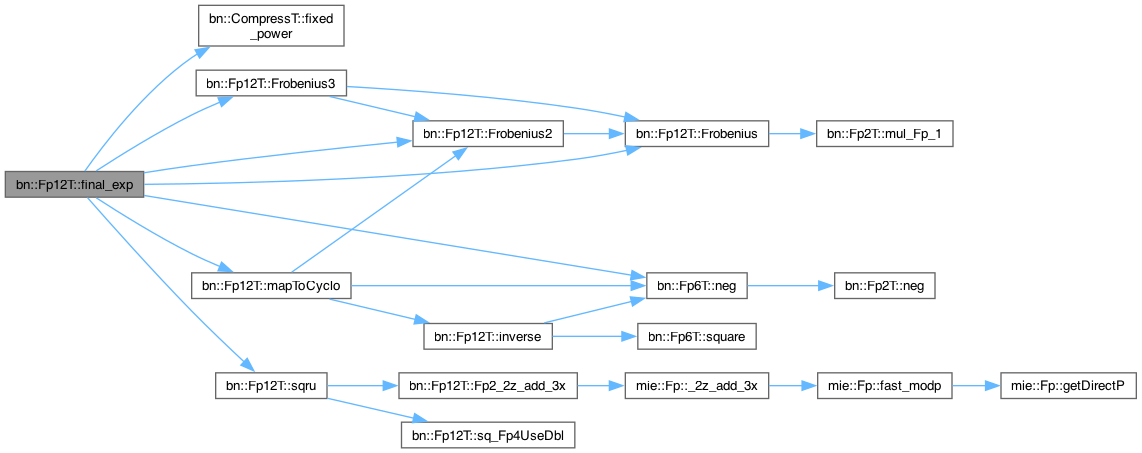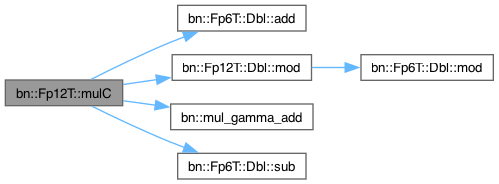Loading...
Searching...
No Matches
Classes |
Public Types |
Public Member Functions |
Static Public Member Functions |
Public Attributes |
Static Public Attributes |
Friends |
List of all members
bn::Fp12T< T > Struct Template Reference
#include <bn.h>
Inheritance diagram for bn::Fp12T< T >:

Collaboration diagram for bn::Fp12T< T >:

Classes | |
| struct | Dbl |
Public Types | |
| typedef T | Fp6 |
| typedef Fp6::Fp2 | Fp2 |
| typedef Fp6::Fp | Fp |
| typedef ParamT< Fp2 > | Param |
| typedef Fp2::Dbl | Fp2Dbl |
| typedef Fp6::Dbl | Fp6Dbl |
Public Member Functions | |
| Fp12T () | |
| Fp12T (int x) | |
| Fp12T (const Fp6 &a, const Fp6 &b) | |
| Fp12T (const Fp &a0, const Fp &a1, const Fp &a2, const Fp &a3, const Fp &a4, const Fp &a5, const Fp &a6, const Fp &a7, const Fp &a8, const Fp &a9, const Fp &a10, const Fp &a11) | |
| Fp12T (const Fp2 &a0, const Fp2 &a1, const Fp2 &a2, const Fp2 &a3, const Fp2 &a4, const Fp2 &a5) | |
| void | clear () |
| Fp * | get () |
| const Fp * | get () const |
| Fp2 * | getFp2 () |
| const Fp2 * | getFp2 () const |
| void | set (const Fp2 &v0, const Fp2 &v1, const Fp2 &v2, const Fp2 &v3, const Fp2 &v4, const Fp2 &v5) |
| bool | isZero () const |
| bool | operator== (const Fp12T &rhs) const |
| bool | operator!= (const Fp12T &rhs) const |
| void | Fp2_2z_add_3x (Fp2 &z, const Fp2 &x) |
| void | sqru () |
| void | sqru (Fp12T &zz) const |
| void | inverse () |
| void | Frobenius (Fp12T &z) const |
| void | Frobenius2 (Fp12T &z) const |
| void | Frobenius3 (Fp12T &z) const |
| void | mapToCyclo (Fp12T &z) |
| void | final_exp () |
 Public Member Functions inherited from mie::local::addsubmul< Fp12T< T > > Public Member Functions inherited from mie::local::addsubmul< Fp12T< T > > | |
| MIE_FORCE_INLINE T & | operator+= (const N &rhs) |
| MIE_FORCE_INLINE T & | operator-= (const T &rhs) |
| MIE_FORCE_INLINE T & | operator*= (const T &rhs) |
Static Public Member Functions | |
| static void | add (Fp12T &z, const Fp12T &x, const Fp12T &y) |
| static void | sub (Fp12T &z, const Fp12T &x, const Fp12T &y) |
| static void | neg (Fp12T &z, const Fp12T &x) |
| static void | mulC (Fp12T &z, const Fp12T &x, const Fp12T &y) |
| static void | squareC (Fp12T &z) |
| static void | sq_Fp4UseDbl (Fp2 &z0, Fp2 &z1, const Fp2 &x0, const Fp2 &x1) |
Public Attributes | |
| Fp6 | a_ |
| Fp6 | b_ |
Static Public Attributes | |
| static void(* | mul )(Fp12T &z, const Fp12T &x, const Fp12T &y) |
| static void(* | square )(Fp12T &z) |
Friends | |
| std::ostream & | operator<< (std::ostream &os, const Fp12T &x) |
| std::istream & | operator>> (std::istream &is, Fp12T &x) |
Detailed Description
Member Typedef Documentation
◆ Fp
◆ Fp2
◆ Fp2Dbl
◆ Fp6
◆ Fp6Dbl
◆ Param
Constructor & Destructor Documentation
◆ Fp12T() [1/5]
◆ Fp12T() [2/5]
◆ Fp12T() [3/5]
◆ Fp12T() [4/5]
◆ Fp12T() [5/5]
Member Function Documentation
◆ add()
|
inlinestatic |
◆ clear()
◆ final_exp()
Definition at line 1776 of file bn.h.
1777 {
1782
1783#ifdef BN_SUPPORT_SNARK
1784 Fp12T::pow_neg_t(f2z, f);
1785 f2z.sqru(); // f2z = f^(-2*z)
1786 f2z.sqru(f6z);
1787 f6z *= f2z; // f6z = f^(-6*z)
1788 Fp12T::pow_neg_t(f6z2, f6z);
1789 // A variable a is unnecessary only here.
1790 f6z2.sqru(a);
1791 // Compress::fixed_power(f12z3, a); // f12z3 = f^(-12*z^3)
1792 Fp12T::pow_neg_t(f12z3, a);
1793 // It will compute inversion of f2z, thus, conjugation free.
1796 // Computes a and b.
1800 // @note f2z, f6z, and f12z are unnecessary from here.
1801 // Last part.
1804 b.Frobenius(f2z); // f2z = f^(q(12*z^3 + 6z^2 + 4z))
1805 z *= f2z; // z = f^(q(12*z^3 + 6z^2 + 4z) + (12*z^3 + 12z^2 + 6z + 1))
1807 z *= f2z; // z = f^(q^2(12*z^3 + 6z^2 + 6z) + q(12*z^3 + 6z^2 + 4z) + (12*z^3 + 12z^2 + 6z + 1))
1810 b.Frobenius3(f2z); // f2z = f^(q^3(12*z^3 + 6z^2 + 4z - 1))
1811 z *= f2z;
1812 // z = f^(q^3(12*z^3 + 6z^2 + 4z - 1) +
1813 // q^2(12*z^3 + 6z^2 + 6z) +
1814 // q(12*z^3 + 6z^2 + 4z) +
1815 // (12*z^3 + 12z^2 + 6z + 1))
1816 // see page 6 in the "Faster hashing to G2" paper
1817#else
1818 // Hard part starts from here.
1819 // Computes addition chain.
1822 f2z.sqru();
1823 f2z.sqru(f6z);
1824 f6z *= f2z;
1825 Compress::fixed_power(f6z2, f6z);
1826 // A variable a is unnecessary only here.
1827 f6z2.sqru(a);
1829 // It will compute inversion of f2z, thus, conjugation free.
1830 Fp6::neg(f6z.b_, f6z.b_);
1831 Fp6::neg(f12z3.b_, f12z3.b_);
1832 // Computes a and b.
1834 a *= f6z;
1836 // @note f2z, f6z, and f12z are unnecessary from here.
1837 // Last part.
1839 z *= f;
1840 b.Frobenius(f2z);
1841 z *= f2z;
1842 a.Frobenius2(f2z);
1843 z *= f2z;
1845 b *= f;
1846 b.Frobenius3(f2z);
1847 z *= f2z;
1848#endif
1849 }
Here is the call graph for this function:

Here is the caller graph for this function:

◆ Fp2_2z_add_3x()
Definition at line 1556 of file bn.h.
Here is the call graph for this function:

Here is the caller graph for this function:

◆ Frobenius()
Definition at line 1640 of file bn.h.
1641 {
1642 /* this assumes (q-1)/6 is odd */
1643 if (&z != this) {
1644 z.a_.a_.a_ = a_.a_.a_;
1645 z.a_.b_.a_ = a_.b_.a_;
1646 z.a_.c_.a_ = a_.c_.a_;
1647 z.b_.a_.a_ = b_.a_.a_;
1648 z.b_.b_.a_ = b_.b_.a_;
1649 z.b_.c_.a_ = b_.c_.a_;
1650 }
1657#ifdef BN_SUPPORT_SNARK
1658 z.a_.b_ *= Param::gammar[1];
1660#else
1665#endif
1666 z.b_.a_ *= Param::gammar[0];
1669 }
Here is the call graph for this function:

Here is the caller graph for this function:

◆ Frobenius2()
◆ Frobenius3()
Definition at line 1696 of file bn.h.
1697 {
1698#if 0
1699 Frobenius2(z);
1700 z.Frobenius(z);
1701#else
1702 z.a_.a_.a_ = a_.a_.a_;
1703 z.a_.b_.a_ = a_.b_.a_;
1704 z.a_.c_.a_ = a_.c_.a_;
1705 z.b_.a_.a_ = b_.a_.a_;
1706 z.b_.b_.a_ = b_.b_.a_;
1707 z.b_.c_.a_ = b_.c_.a_;
1714
1715#ifdef BN_SUPPORT_SNARK
1716 z.a_.b_ *= Param::gammar3[1];
1718#else
1719 z.a_.b_.mul_x();
1721#endif
1722 z.b_.a_ *= Param::gammar3[0];
1725#endif
1726 }
Here is the call graph for this function:

Here is the caller graph for this function:

◆ get() [1/2]
◆ get() [2/2]
◆ getFp2() [1/2]
◆ getFp2() [2/2]
◆ inverse()
Definition at line 1620 of file bn.h.
1621 {
1622 Fp6 tmp0;
1623 Fp6 tmp1;
1624 Fp2 tmp2;
1627 Fp2::mul_xi(tmp2, tmp1.c_);
1628 tmp0.a_ -= tmp2;
1629 tmp0.b_ -= tmp1.a_;
1630 tmp0.c_ -= tmp1.b_;
1631 tmp0.inverse();
1635 }
Definition bn254_if.hpp:87
Here is the call graph for this function:

Here is the caller graph for this function:

◆ isZero()
◆ mapToCyclo()
Definition at line 1731 of file bn.h.
1732 {
1733 // (a + b*i) -> ((a - b*i) * (a + b*i)^(-1))^(q^2+1)
1734 //
1735 // See Beuchat page 9: raising to 6-th power is the same as
1736 // conjugation, so this entire function computes
1737 // z^((p^6-1) * (p^2+1))
1738 z.a_ = a_;
1740 inverse();
1741 z *= *this;
1742 z.Frobenius2(*this);
1743 z *= *this;
1744 }
Here is the call graph for this function:

Here is the caller graph for this function:

◆ mulC()
|
inlinestatic |
Definition at line 1450 of file bn.h.
1451 {
1452 Dbl zd;
1453 Fp6 t0, t1;
1454 Fp6Dbl T0, T1, T2;
1455 // # 1
1458 Fp6::add(t0, x.a_, x.b_);
1460 // # 2
1461 Fp6Dbl::mul(zd.a_, t0, t1);
1462 // # 3
1463 Fp6Dbl::add(T2, T0, T1);
1464 // # 4
1465 Fp6Dbl::sub(zd.b_, zd.a_, T2);
1466 // #6, 7, 8
1467 mul_gamma_add<Fp6Dbl, Fp2Dbl>(zd.a_, T1, T0);
1468 Dbl::mod(z, zd);
1469 }
Here is the call graph for this function:

◆ neg()
◆ operator!=()
◆ operator==()
◆ set()
◆ sq_Fp4UseDbl()
|
inlinestatic |
Definition at line 1509 of file bn.h.
1510 {
1511 Fp2Dbl T0, T1, T2;
1512 Fp2Dbl::square(T0, x0);
1513 Fp2Dbl::square(T1, x1);
1514 Fp2Dbl::mul_xi(T2, T1);
1515 T2 += T0;
1516 Fp2::add(z1, x0, x1);
1517 Fp2Dbl::mod(z0, T2);
1518 // overwrite z[0] (position 0).
1519 Fp2Dbl::square(T2, z1);
1520 T2 -= T0;
1521 T2 -= T1;
1522 Fp2Dbl::mod(z1, T2);
1523 }
Here is the caller graph for this function:

◆ sqru() [1/2]
Definition at line 1561 of file bn.h.
1562 {
1569 Fp2 t0, t1;
1571 // For A
1572 Fp2::sub(z0, t0, z0);
1573 z0 += z0;
1574 z0 += t0;
1575#if 0
1576 Fp2_2z_add_3x(z1, t1);
1577#else
1578 Fp2::add(z1, t1, z1);
1579 z1 += z1;
1580 z1 += t1;
1581#endif
1582 // t0 and t1 are unnecessary from here.
1583 Fp2 t2, t3;
1586 // For C
1587 Fp2::sub(z4, t0, z4);
1588 z4 += z4;
1589 z4 += t0;
1590#if 0
1591 Fp2_2z_add_3x(z5, t1);
1592#else
1593 Fp2::add(z5, t1, z5);
1594 z5 += z5;
1595 z5 += t1;
1596#endif
1597 // For B
1598 Fp2::mul_xi(t0, t3);
1599#if 0
1600 Fp2_2z_add_3x(z2, t0);
1601#else
1602 Fp2::add(z2, t0, z2);
1603 z2 += z2;
1604 z2 += t0;
1605#endif
1606 Fp2::sub(z3, t2, z3);
1607 z3 += z3;
1608 z3 += t2;
1609 }
static void sq_Fp4UseDbl(Fp2 &z0, Fp2 &z1, const Fp2 &x0, const Fp2 &x1)
Definition bn.h:1509
Here is the call graph for this function:

Here is the caller graph for this function:

◆ sqru() [2/2]
◆ squareC()
Definition at line 1476 of file bn.h.
1477 {
1478 Fp6 t0, t1;
1479 // # 1, 2
1480 Fp6::add(t0, z.a_, z.b_);
1481 // b_.mul_gamma(t1); t1 += a_; # 3
1482 mul_gamma_add<Fp6, Fp2>(t1, z.b_, z.a_);
1483 // # 4
1484 z.b_ *= z.a_;
1485 Fp6::mul(z.a_, t0, t1);
1486 // # 5, 6, 7 @note It's typo.
1487 mul_gamma_add<Fp6, Fp2>(t1, z.b_, z.b_);
1488 // # 8
1489 z.a_ -= t1;
1490 z.b_ += z.b_;
1491 }
Here is the call graph for this function:

◆ sub()
Friends And Related Symbol Documentation
◆ operator<<
◆ operator>>
Member Data Documentation
◆ a_
◆ b_
◆ mul
◆ square
The documentation for this struct was generated from the following file:
- libraries/fc/libraries/ff/depends/ate-pairing/include/bn.h









